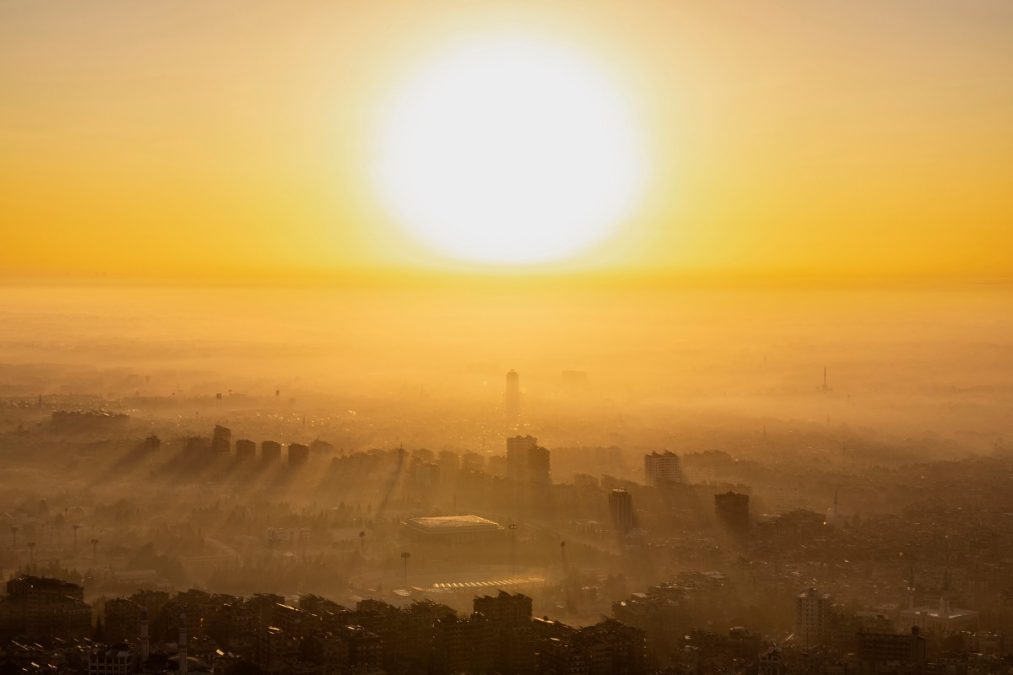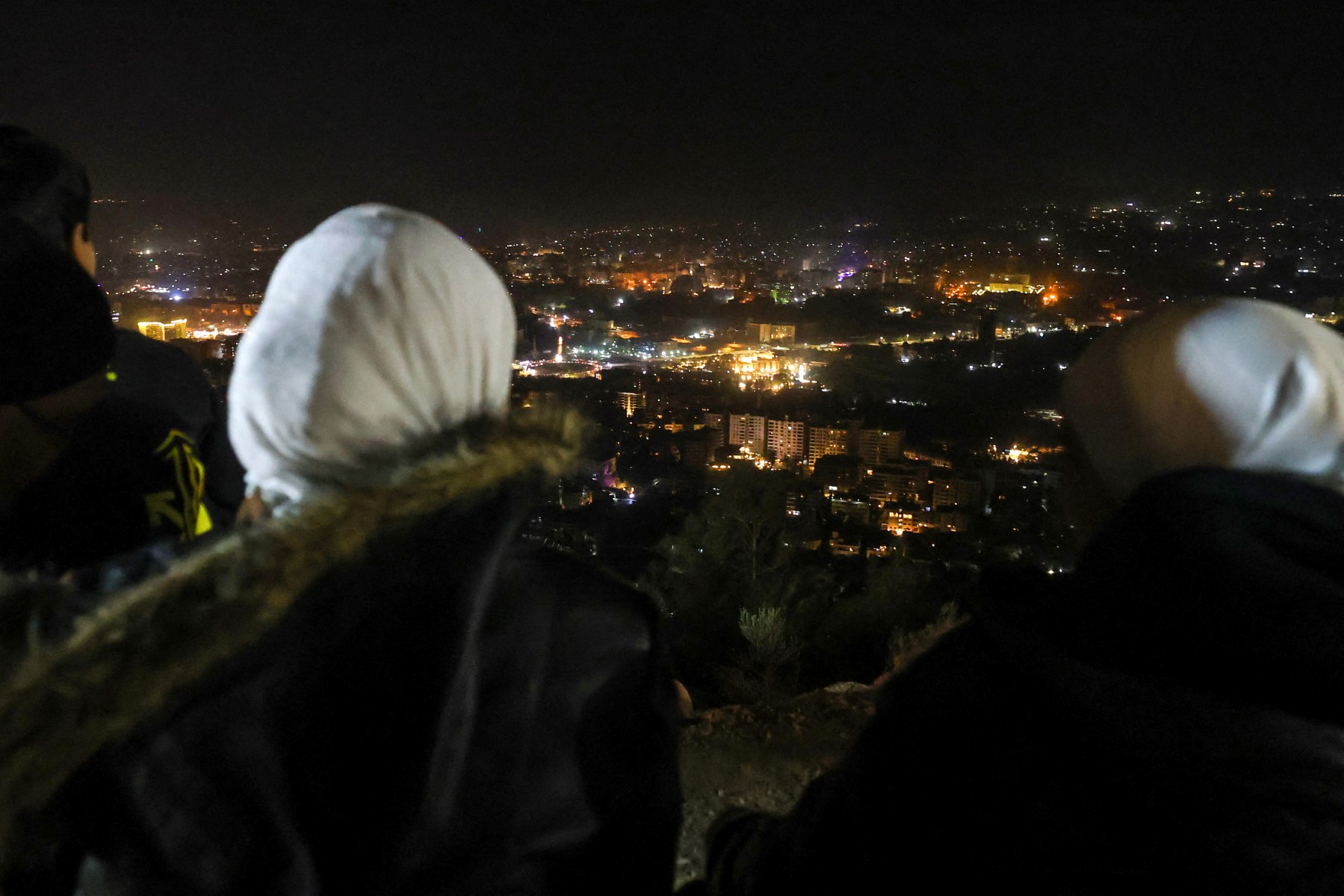Damascus, Syria – After the fall of Bashar al-Assad, Afaf Mohammed did what she could not for more than a decade: she climbed Mount Qasyun to admire a sleeping Damascus “from the sky” and watch the sun rise.
Through the long years of Syria’s civil war, which began in 2011 with a government crackdown on pro-democracy protesters, people were not allowed access to the mountain.
But now they can return to look down again on their capital, with its high-rise hotels and poor suburbs exhausted by war.
When night falls, long queues of vehicles slowly make their way up a twisting road to a brightly lit corniche at the summit.
Once there, they can relax, listen to music, eat and drink, and, inevitably, take selfies.
On some evenings there have even been firework displays.
Afaf Mohammed told AFP that “during the war we weren’t allowed up to Mount Qasyun. There were few public places that were truly accessible.”
At her feet, the panorama of Syria’s capital stretched far and wide. It was the second time in weeks that the dentist in her thirties had come to the mountaintop.
Ideal for snipers –
Her first was just after a coalition of Islamist-led rebels entered the city, ousting Assad on December 8.
On that occasion she came at dawn.
“I can’t describe how I felt after we had gone through 13 years of hardship,” she said, wrapped close in an abaya to ward off the chilly breeze.
Qasyun was off limits to the people of Damascus because it was an ideal location for snipers — the great view includes elegant presidential palaces and other government buildings.
It was also from this mountain that artillery units for years pounded rebel-held areas at the gates of the capital.
Mohammed believes the revolution brought “a phenomenal freedom” that includes the right to visit previously forbidden places.
“No one can stop us now or block our way. No one will harm us,” she said.
Patrols from the security forces of Syria’s new rulers are in evidence, however.
They look on as a boy plays a tabla drum and young people on folding chairs puff from water pipes as others dance and sing, clapping their hands.
Everything is good-natured, reflecting the atmosphere of freedom that now bathes Syria since the end of Assad rule.
Gone are the stifling restrictions that once ruled the people’s lives, and soldiers no longer throng the city streets.
Hot drinks and snacks –
Mohammad Yehia, in his forties, said he once brought his son Rabih up to Mount Qasyun when he was small.
“But he doesn’t remember having been here,” he said.
After Assad fell, his son “asked if we would be allowed to go up there, and I said, ‘Of course’,” Yehia added.
So they came the next day.

Yehia knows the place well — he used to work here, serving hot drinks and snacks from the back of a van to onlookers who came to admire the view.
He prides himself on being one of the first to come back again, more than a decade later.
The closure of Mount Qasyun to the people of Damascus robbed him of his livelihood at a time when the country was in economic freefall under Western sanctions. The war placed a yoke of poverty on 90 percent of the population.
“We were at the suffocation point,” Yehia told AFP.
“Even if you worked all day you still couldn’t make ends meet.
“This is the only place where the people of Damascus can come and breathe a little. It’s a spectacular view… it can make us forget the worries of the past.”
Malak Mohammed, who came up the mountain with her sister Afaf, said that on returning “for the first time since childhood” she felt “immense joy”.
“It’s as if we were getting our whole country back,” Malak said. Before, “we were deprived of everything”.
Damascus rally demands news of missing Syrians
A silent crowd gathered in the Syrian capital Damascus on Friday to press the new authorities about the fate of relatives who went missing under Bashar al-Assad and to demand justice for their loved ones.
The fate of tens of thousands of people who disappeared under Assad — who was ousted on December 8 by a coalition of Islamist-led rebels — is a key question after more than 13 years of devastating civil war that saw upwards of half a million people killed.
Dozens of sombre protesters holding pictures of the disappeared assembled in central Damascus’s Hijaz Square, an AFP journalist said.
“It is time for tyrants to be held accountable,” read a black banner unfurled from the balcony of the elegant Ottoman-era train station.
Other placards read: “Revealing the fate of the missing is a right,” and “I don’t want an unmarked grave for my son, I want the truth.”
Such a demonstration would have been unthinkable under Assad’s rule, but it is now possible under the new authorities dominated by the Islamist group Hayat Tahrir al-Sham, which led the offensive that overthrew him.
“Unfortunately for many years we were united in the grief of absence and uncertainty, waiting for our loved ones, one amnesty after another,” said Wafa Mustafa in a speech in the midst of the protesters.
Her father Ali was arrested in 2013.
“We all saw the scenes of prisoners being freed. It was a source of joy, but it was also very difficult because we did not see our own loved ones among them,” she said.
“We are here to say we will not accept anything less than the whole truth, to know what happened to our relatives, who tortured them, and if they were buried, where they are,” she added.
‘He died instantly’ –
Amani al-Hallaq, 28, was seeking news about where to find the remains of her cousin, who was kidnapped in 2012 when he was a student dentist.
“I was once one of those who was afraid. This is the first time I am protesting,” the 28-year-old Amani said.
Her cousin was abducted as he came out of the university, said the young woman in a headscarf.
“They pulled out his nails. He died instantly,” she said.
“We want to know where the disappeared are, their bodies, so we can identify them.”
On Monday, three NGOs called on Syria’s new authorities to ensure that proof of the “atrocities” committed under Assad rule was preserved.
On Thursday, security forces arrested a military justice official of the toppled government.
Activists say Mohammed Kanjo Hassan issued death sentences for thousands of people held in the notorious Saydnaya prison near Damascus.
Saydnaya was the site of extrajudicial executions, torture and forced disappearances, and epitomised the crimes committed against Assad’s opponents.
Holding a picture of his cousin, who was tortured to death in jail in 2012, Yussef al-Sammawi said he had come from Germany.
He said he wanted justice to be done and former officials to be held to account — but “in a fair way that provides relief to the families so they can live in this country”.








